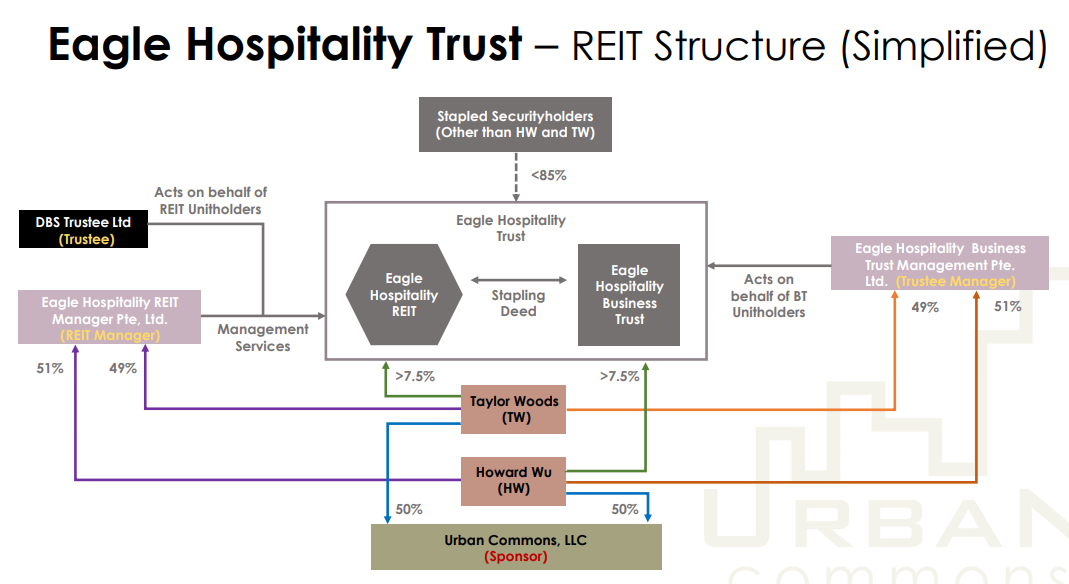A second round of media-release by UC
This is a follow-up article from the previous article titled: Eagle Hospitality Trust (EHT). Hearing Sponsor urban Common side of the story. In that article, I look to summarise the issues facing Eagle Hospitality Trust, a business trust that was widely followed by many Singaporean income investors due to its attractive yield structure.
Alas, the trust was suspended in March 2020, less than one year from its listing date of May 2019. Unitholders did not manage to receive even a single dividend payout when the Trust was abruptly suspended on voluntary ground.
Urban Commons, whom many felt was the cause of Eagle Hospitality Trust “demise”, came out with their side of the story which can be summarised as:
- The rental payment was affected by COVID, which is an event out of their control.
- The supposed “Forensic review” by EHT’s appointed advisory firm was done in bad faith, one which damage the reputation of Urban Commons by attempting to create some appearance of wrong-doing on the part of the sponsor
- Urban Common attempted to engage with the Trustee back in April but met with no response from the Trust and its Trustee. This is something that unitholders of EHT are not made aware of.
On 21 August 2020, Urban Commons released another media article entitled: “Eagle Hospitality Trust Sponsor urges collaboration to save REIT”.
Urban Commons believe it is time to unite and deliver a sustainable survival plan for the REIT.
“It is time to unite, collaborate, and create strategies that can mitigate losses and liabilities in these challenging times. Rather than working together, it seems that EHT’s advisors have misled the REIT into believing there is only one outcome – the replacement of the Sponsor no matter the damage that would be sustained in the process. Must everything be adversarial and cause uncertainty? This a recipe for disaster, we are already watching millions of unitholder’s dollars being wasted,”
Howard Wu, founder, and Principal at UC
I summarise some of the key details in the media release for easy reading:
- The Lessee highlighted that during a pandemic-like situation, the lessee will not need to provide any income to the Trust. This is stated in the IPO
- The locking of Urban Commons’ bank accounts by Bank of America Mortgage Lending (BAML) has prevented UC from making the necessary payments to the entitled parties such as the hotel managers. UC is subsequently blamed for the collapse of the lessee/lessor structure.
- In a Force majeure event like the current COVID scenario, the losses and maintenance expenses should no longer be the responsibility of the lessee.
- The accounts payable of Eagle Hospitality Trust has increased from USD$20m to USD$45m since the lessor (EHT) became responsible for maintaining the building to an operable standard.
- The sponsor was able to help the REIT maintain the US$80m in cash, including US$28m in security deposits + US$32m ready for distribution to unitholders before BAML locked the bank accounts and caused the structure to collapse.
- Income generated from the 3 hotels which remain operational were siphoned (either by FTI Consulting or BAML) from revenue collection and used to pay current and ongoing expenses of those hotels that remained close. This resulted in the management company, Crestline Hotel & Resorts, operating two of the three hotels to issue specific default notices.
Survival Plan
Urban Commons has drafted a survival plan for Eagle Hospitality Trust based on the following three major points:
- Refinance the defaulted debt quickly, as Urban Commons already have a term sheet in place for that refinancing
- Raise the minimum amount to sustain the REIT and to minimize dilutions to unitholders
- Come up with an amicable solution to restart and sustain the operations of the REIT.
Urban Commons believe that they are in the best position to help the REIT. They highlighted that the REIT is wasting millions of dollars through the hiring of these 3rd party consultants when the best solution has been right in front of them the entire time and presented to the managers and trustee of the REIT on multiple occasions but to no avail.
Quick thoughts
While the survival plan drafted up by Urban Commons is lacking in detail, it is at least a plan that the trust managers and trustee of EHT should consider if they have got no other viable solutions at present.
While I understand that a request for proposal (RFP) has been made with 20 August 2020 being the deadline set for the solicitation of the proposal, it is unclear at present how many proposals EHT has received thus far and the duration needed to further evaluate the feasibility of these proposals.
Time is not on the side of Eagle Hospitality Trust unitholders who still wonder if the trust is salvageable and even if so, will the outcome be one that is highly dilutive for them.
Urban Commons has stated that they can refinance the defaulted debt and come out with a fund-raising solution that seeks to limit the amount of dilution to existing unitholders. Can they accomplish that? Well, it is not for me to judge but I believe that EHT’s managers and trustees have the obligations to unitholders to at least evaluate the feasibility of UC’s survival plan and if they are indeed actionable.
Urban Commons has been rather pro-active to state their stance and position. Whether they are right or wrong, it is up to EHT and its trustee to stand-up and rebut the “key argument” that what they are currently doing or NOT doing is not in the best interest of EHT’s unitholders.
So far, we have been hearing from Urban Commons. Will Eagle Hospitality Trust’s managers and trustee be voicing their side of the story as well? With these new queries + additional information in mind, It might be a good opportunity for minorities to voice out their thoughts and concerns to management of EHT during the Annual General Meeting to be held on 31 August 2020.
Additional disclosure by Urban Commons
Besides the Media release article, Urban Commons has “voluntarily” made additional disclosures on questions that the public and unitholders have in mind.
I applaud that effort which shows that they are willing to be as transparent as possible. I will state the key questions raised as well as UC’s answers to them. I will also look to chip in my thoughts on UC’s answers under “NAOF”.
General Questions
What did Urban Commons do with the monies raised during the IPO of US$565 million?
UC: Proceeds from the IPO were used in line with EHT’s Prospectus. DBS purchased assets on behalf of EHT from the entities that held the US real-estate properties. The Sponsor did not cash out proceeds from the IPO and is yet to financially benefit from the REIT’s operations.
NAOF: A little vague in terms of specific details. It will be great if there is an exact breakdown of how the US$565m raised were being spent on specific asset purchases and these details should be confirmed by the trustee.
Why are the master lessees unable to support and provide the necessary funding for the operations of the hotels with the onset of COVID-19?
UC: • Under the Lessee/Lessor structure in normal circumstances, the Lessor’s role is to maintain the hotel while the Lessee operates the business and passes through more than ~98% of net revenues to the REIT. However, it is not designed to sustain force majeure events, such as Hurricane Dorian or COVID-19, which will affect all hospitality assets alike, with a level of income that will likely remain significantly below pre-COVID levels for a sustained period
• one of the risk factors highlighted in the Prospectus was the risk that EHT’s ability to generate revenues and the value of its Properties could decline materially because of widespread communicable diseases, such as the human avian flu and SARS and other events beyond the control of EHT.
• This is a period for all stakeholders to unite to tide across COVID-19 to keep all our losses to a minimum. However, it is unfortunate that instead of uniting at the onset of COVID-19, defaults were filed based one one-sided legal interpretations, overlooking the Force Majeure clauses. Operating accounts were subsequently locked by BAML, creating panic with creditors and the events that unfolded thereafter.
NAOF: I believe that it is only reasonable that in a Force Majeure situation like what we are witnessing with COVID that the payment of rental is suspended, particularly if the hotels are mandated to stop all operations by the government.
Whether or not the operational risk in such an environment changes to the lessor from the lessee is up for interpretation based on the master lease agreement.
If the locking up of their accounts by BAML resulted in UC being unable to fulfill their necessary financial obligations which then cascade into the issue of defaults made by the hotel management companies, then UC should not be made to bear the responsibility, in my view.
There have been queries regarding the Master Lessee’s payment of rent even before COVID19 hit, as the master lessees only made full payment till Dec 19. Can the Group clarify on the payment of rent in the first 3 months of the year?
UC: ● The Sponsor and Lessees did not guarantee continued operation of EHT’s properties or payment of rental in the face of a Force Majeure event such as a Category 5 Hurricane or COVID-19. It is for this type of situation that Casualty Clauses exist in the Master Lease Agreements (MLAs).
● It is important to understand that there had previously been an overpayment to EHT after the Orlando hurricane in 2019, when considering the period from January 2020 to March 2020.
● For January 2020, the rent was offset by the amount of rent that the master lessee had overpaid EHT. To explain, in 2019 a hurricane hit EHT’s largest hotel in Orlando. Together with the current global pandemic, the Orlando Hotel Lessee was not required to pay Fixed Rent from September 2019 through to the present. However, the master lessee had continued to pay for the rent resulting in an overpayment of approximately US$3 million rent which should have been used to offset Fixed Rent in January 2020.
● For February, the portfolio was compromised by the significant decrease in EBITDA due to the COVID-19 pandemic; March 2020 result was negative to the tune of $4 million and wiped out all income starting with the February 2020 income.
● From March, COVID-19 was affecting the income of the hotels.
NAOF: Again, my question over here is whether the operational risk is immediately transferred to the Lessor from the onset of the COVID-19 problem which UC mentioned began in February. If not, then should the losses incurred by UC in March be used to offset the supposed rental income payment that was outstanding in February?
Events after March 2020 is pretty straight forward and I believe that all rental payments should reasonably be suspended.
Why did UC structure the NDA that cause EHT to assume potential liabilities (be the guarantor) on defaults of UC? How was that done in good faith and in the interest of EHT unitholders? Who were the lawyers that reviewed this?
UC: ● The Lessees did not request/design the NDAs to obtain a profit for the Lessees.
● NDAs are customary in the USA, particularly in a lessee/lessor structure, and are outlined in the MLA normal course of business. These NDAs were also described at the time of IPO in the EHT Prospectus.
● Third-party management companies often require NDAs, designed by hotel managers to protect and maintain operations, including payroll of the hotel’s staff and honest workers.
● All of the hotel’s operational costs incurred by the hotel manager and its employees were utilized to generate income which is turned over to the REIT. The MLAs have always clearly stated that customary non-disturbance agreements may be entered when required by a hotel manager.
● The manner that these NDAs have been announced by the REIT is another example of information being used to portray the Sponsor in a negative light.
NAOF: It seems like the public has the impression that the NDA’s were structured in bad faith by UC to push all the liabilities to EHT in the event of a default. However, if it is a customary affair in the US and required by the hotel managers for their assurance, then UC should not be painted in the light that there are any wrongdoings on their part.
Why didn’t UC provide the City of Long Beach access to its financial records and caused defaults under the ground lease by not complying with covenants and duties? Why are there still outstanding unpaid taxes?
UC: ● All taxes and late fees were paid to the City of Long Beach in May 2020. Two months of rent were missed in 2019 due to an administrative error – this balance was also cleared.
● Urban Commons does not administer payables at a property level, however, once we were notified about outstanding taxes, we ensured the balance was promptly resolved. Despite the Lessees having cleared these items, EHT did not disclose this information publicly, only that the payments were initially missed.
● UC has worked with the Long Beach City Auditor’s Office to provide all of the necessary audited financials, however, due to one-off complexities resulting from EHT’s IPO taking place in 2019, some documentation remains outstanding; the City of Long Beach has provided UC an extension to provide these audited financials and UC is on track to deliver them in line with this extension.
NAOF: The last point by UC seems to imply that they are coordinating with Long Beach City Auditor’s Office to provide them with the necessary audited financials. We will see if there is anything “unusual” from the audit findings in due time.
Ideally, this situation should be resolved asap to clear all doubts that there are any “financial wrongdoings” on the part of UC which the “forensic accounting” by FTI seems to suggest.
Why wasn’t the full security deposit being provided in the first place?
UC: ● Per the original agreement, the Lessee was to fund USD$23MM in cash as a Security Deposit (SD), with the remaining $20MM as a Letter of Credit (LOC) to be provided within the grace period.
● The bank originally set to provide the LOC needed more time due to uncertainties surrounding two of the largest portfolio assets, caused by negative media stories regarding repair costs at the Queen Mary, as well as Hurricane creating a Force Majeure event at the Holiday Inn in Orlando.
● During this period, an approved term sheet was obtained from a reputable bank, however, due to market conditions and the onset of COVID-19, the bank was not able to fulfill its promise of a LOC. UC then injected an additional US$5MM in cash and EHT granted an extension to provide the LOC which was approved by EHT’s board, DBS Trustee and BAML
NAOF: Well, the first point made by UC seems to imply that they do not need to fund the full US$43m in cash as per the original agreement. I am not sure if this is a “special arrangement” between UC and EHT’s board which should not be allowed in the first place as per mandatory requirements.
However, since all parties know about the situation, then again it will be unfair to say that UC tried to “short-change” the REIT. Nonetheless, I believe it is UC’s obligation at the end of the day to provide the required stated cash and LOC amount regardless of what issues there might be.
On 29 June, EHT announced the commencement of forensic accounting investigation of Sponsor and Master Lessees. Can you comment on that?
UC: ● The announcement has led to misconceptions by the media and the public on UC. The Trustee, SC, and FTI are already in possession of the information they are contractually entitled to (including audited statements setting out EBDITA of the US properties) and have no legal authority to go into the records or systems of the Sponsor and Master Lessees.
● As such, in reality, there is no “forensic accounting investigation” of Urban Commons
NAOF: I believe the audit findings by Long beach City might shed some light on the financial status of UC.
Allegations of claims
In announcements made by the managers and REIT trustee of EHT, they mentioned that they discovered several failures by the Master Lessees to pay liabilities to third parties. The liabilities include expenses that are necessary and critical to preserve and maintain the underlying value of the properties in EHT’s such as taxes, utilities, and payables to essential goods and service providers- amounting to US$44.6m. There is also outstanding rent until May of US$19.3m. As a result, the managers and REIT trustee had to use the distribution meant for shareholders to pay for these expenses, in order to preserve the value of the properties.
a) Why weren’t these liabilities settled?
UC: ● Any hotel will always have an amount of accounts payable as well as accounts receivable. In a typical Lessor/Lessee structure in the US, the Lessee is responsible to operate properties and deliver the revenue to the Lessor (in our case, owned by EHT).
● Prior to February 2020, the default notices listed in EHT’s recent announcement had not been issued, in part due to the Sponsor’s infusion of cash into hotel operations. For example, the Sponsor had paid in rent to EHT in 2019 in excess of the total income generated by the portfolio.
● However, during a Force Majeure event, the ability to generate hotel income has been severely affected. This is consistent with the risk factors identified in EHT’s Prospectus which identifies such events including “widespread communicable diseases (such as the human avian flu and severe acute respiratory syndrome (“SARS”) and other events beyond the control of EHT”.
● In this situation, there are casualty (i.e. Force Majeure) provisions (the “Casualty Clauses”) in the Master Lease Agreements (“MLAs”). Under the Casualty Clauses, the Lessees are not obliged to pay rent during this time. We have raised this issue repeatedly with EHT and its consultants and advisers.
● In addition, the Lessees have been operating up to February 2020 with approximately $20MM accounts payable (“AP”) and were not issued defaults. Subsequently, after EHT employed third party consultants, who have not cooperated with the Lessees, and the AP has risen from approx. US$20MM to approx. US$45MM.
NAOF: UC did not refer back to the fact that their accounts were locked by BAML and hence there is no way for them to access capital to meet their financial obligations. Again, outstanding rental payments of US$19.3m, in this case, should be “waived-off” in the event of a force majeure, unless this rental payment is for the outstanding amount before COVID-19.
EHT’s managers and its trustee should explain how did the accounts payable increase from US$20m to US$45m during this period since UC no longer have access to the accounts.
b) Aren’t the master lessees responsible for the maintenance of EHT’s properties? If yes, why didn’t the master lessees do so?
UC: • In our opinion, the Lessees do not warranty pandemics, therefore the US $19.3MM rent is not owed due to COVID-19, a Force Majeure event which is consistent with the risk factors identified on page 74 of EHT’s IPO Prospectus which identifies such events.
• During a pandemic situation, it is clear from the Force Majeure clause in the MLAs that, in addition to mitigated rent, maintenance of the hotels should also fall upon the Lessor until hotel operations are restarted and the liabilities fall upon the Lessee once more.
NAOF: This is something that both parties (lessee and lessor) should have a clear understanding of in terms of responsibilities and risk structure in the event of a force majeure. Are both parties on the same page that operational risk will effectively shift to the lessor from the lessee in the event of a force majeure?
c). In a BT article, it was quoted by one of the unitholders who sent an open letter to EHT’s managers questioning “Urban Commons has raised gross proceeds of US$566 million via the initial public offering of EHT – has there been any attempt to place the third-party payables onto Urban Commons, since they are the original responsible party? If not, is there any intention to place the liabilities onto Urban Commons soon?” What is UC’s response to this suggestion?
UC: • The Sponsor and Lessees do not guarantee continued operation of EHT’s properties or payment of rental in the face of a Force Majeure event such as COVID-19. Nonetheless, UC communicated a plan to provide critically needed financial support to EHT; however, we have been unable to date to obtain cooperation to implement this plan from EHT and its consultants.
NAOF: As previously highlighted by UC, they mentioned that they have not “cash-out” from the IPO. Secondly, their accounts have been “locked out” by BAML. Thirdly, rental payments should have been “waived” and fourthly, according to UC, operating risk falls onto the lessor’s responsibility in a force majeure.
EHT has in earlier announcements mentioned that UC had not paid TOT and TBID assessments to the City of Pasadena from May 19-Feb 20. EHT was listed on May 19. In June 2020, EHT also received a notice of default from the City of Long Beach in relation to the lease agreement with Queen Mary because UC failed to pay monthly TOT amounts to the City of Long Beach for 2019 and 2020. What are UC’s reasons for missing these payments?
UC: • It is worth noting that such notices of default did not exist prior to the onset of COVID-19.
• Urban Commons does not administer payables at a property level, however, once we are notified about outstanding taxes, we ensure the balances are promptly resolved.
NAOF: I can’t say for sure if there is indeed an issue with the financials of UC which resulted in them consistently missing tax-related payments. They argue that they do not administer payables at a property level but still it does not “look good” on them that they will only start paying these dues upon notice of defaults.
How about the taxes for the other hotels such as Holiday Inn Denver East- Stapleton and Renaissance Denver Stapleton, Holiday Inn Resort Orlando Suites- Waterpark that was announced on 14 Aug 20? Whose responsibility is it?
UC: See answer for question 11
In the 14 Aug 20 announcement, it was also stated that EHT has received notices of default and termination under the respective franchise agreements due to the amount outstanding from Master lessees to the franchisors.
a) Why did the master lessees default on these payments?
b) How will that affect the working relationships with these franchisors in the future?
c) How will that in turn affect UC’s plan to save the REIT and run the hotels in the future given the past defaults with these franchisors?
UC: ● In February, a seasonally slow time of year when the impact of COVID-19, and the resulting economic crisis and devastation to the hotel, tour, travel and airline industries, started to become more clear and evident, Bank of America Mortgage Lending (BAML) locked the Lessee’s bank accounts, making it impossible for the Sponsor to continue funding the hotels’ operations.
● This interference from consultants during operations made it extremely difficult to navigate during COVID-19 and fund the necessary capital to maintain operations.
● UC has communicated a plan to provide critically needed financial support to EHT; however, has been unable to date to obtain cooperation to implement this plan from EHT and its consultants.
● The Lessees have plans with all franchisors to pay off these outstanding balances in a fair and amicable manner, pending the Trustee’s response to the Sponsor’s plan.
NAOF: As mentioned, I believe it is only fair that if their accounts are being locked out by BAML, there is no way for them to meet their financial obligations. Moreover, if they have indeed reached out to EHT and the trustee on numerous occasions only to be ignored, then it is only fair that unitholders hear the reason behind the non-responsiveness of EHT’s managers and the trustee.
Did the hurricane hit the Orlando property? Why was damage made by the hurricane not insurance claimable?
UC: • The Orlando hotel was impacted and sustained damages as a result of Hurricane Dorian.
• After analyzing property damage versus the insurance policy’s minimum deductible, it was decided that an insurance claim may not have been applicable.
NAOF: Is the insurance policy taken out comprehensive enough to cover for future property damages like in the current case? If the damage is “minor” will it still be considered as a force majeure?
Paycheck Protection Program
Paycheck Protection Program – Overall Statement
UC: • A mistake was made, whereby a Paycheck Protection Program loan application was submitted in the wrong entity name, however, steps were proactively taken to address the issue. We understand that because The Queen Mary Master Lessor is foreign-owned (EHT is considered to have non-US ownership), the Queen Mary Master Lessor is not eligible for a loan under the Paycheck Protection Program. This was only 1 application out of other loan applications that were made. No issue has been raised regarding our other applications.
• After we discovered this error, we proactively informed the lender and the US Small Business Administration (SMB), the Government the entity which issues the loans, and provided all documentation necessary to transfer the loan to the correct applicant, the Lessee.
• Despite taking all the necessary steps to rectify the situation, including informing EHT and its advisors, UC is being targeted with misconceived allegations, further damaging our reputation without cause. This is another example of EHT using an SGX announcement to draw public attention and outrage, without putting the matter in its proper context.
NAOF: Point 3 seems to indicate that the mistake was highlighted to EHT and its advisors in advance before the announcement by EHT, pointing out this “problem” in August. If this is the case, then it will be unfair to fault UC on this “mistake” which only pertains to one single property among its 18 properties portfolio.
However, if this mistake was only “pro-actively rectified” by UC after it was made public by EHT, then one will definitely question the integrity of UC’s management, in this case.
The US has introduced a $2.2 trillion economic stimulus bill. Has UC and/or EHT received any funds so far and how has that relief been used?
UC: • Yes, UC has applied for loans under the Payroll Protection Program and used them for employees in accordance with the terms of the program.
• In the US there is a Paycheck Protection Program. The objective of the Paycheck Protection Program is similar to Singapore’s Job Support Scheme, to keep workers employed.
NAOF: It will be good if UC can disclose the full amount received and how this amount has been distributed to the individual properties.
Urban Common’s plan to save the REIT
It was stated that UC has a plan to provide critically needed financial support to EHT. What does that plan entail, and will the plan include a more independent structure such as changing the REIT manager and/or the current master lessees?
• plan aims to minimize burn rate, prevent unnecessary dilution, and raise the capital necessary to survive COVID-19. Properties will generate minimal income during the pandemic – whether with UC or with a new partner – as such the utmost priority now is to implement a cost-saving plan to ensure the survival of the REIT.
• The sponsor is in a unique position to deliver the most efficient and cost-saving plan, relative to a third party who could take a longer time to implement while burning millions of dollars in terms of consultant fees during this period.
NAOF: It will be good to get an answer from EHT and its trustee if UC’s plan, which is currently the only one on the table, is a feasible one to be implemented in the interest of its unitholders. If so, should there be a cordial agreement and understanding that UC is indeed in the best position to rescue the Trust?
If EHT and its trustee do not think that UC’s proposal is a viable solution, do they have an alternative solution on the table that will aid in the resumption of EHT trading status? Have they received other proposals by 3rd parties and how are those proposals superior vs. UC’s?
Conclusion
The ball is now squarely in EHT/Trustee/consultant’s court to address the issues as highlighted by UC. Is the trust indeed hemorrhaging millions of dollars every month? Is there still available cash to continue spending on 3rd party consultant fees etc over the coming months? What are the key findings of these 3rd party consultants thus far? Why didn’t EHT/Trustee respond to UC’s proposal earlier to help find a feasible solution to rescue the Trust? Will there be an asset sale administered by EHT and is this the best course of solution for unit holders, given that a sale done in this scenario will likely be on a “fire-sale” basis? Will there be any capital left to distribute back to unitholders after repayment of debt, if a fire-sale on all the properties is made?
These are questions that unitholders should have an answer to. I believe that UC has come out in public to address their “grievances”. Might it now be time for EHT and the relevant parties to engage them fairly and transparently, with the ultimate aim of finding a solution that is in the best interest of minority unitholders of EHT to put an end to this saga?
Will EHT unitholders finally see the light at the end of the tunnel?
Do Like Me on Facebook if you enjoy reading the various investment and personal finance articles at New Academy of Finance. I do post interesting articles on FB from time to time which might not be covered here in this website.
Join our Telegram broadcast: https://t.me/gemcomm
SEE OUR OTHER WRITE-UPS
- EAGLE HOSPITALITY TRUST (EHT): HEARING SPONSOR URBAN COMMON SIDE OF THE STORY
- SEMBCORP INDUSTRIES 4Q19 BETTER THAN EXPECTED. SHENG SIONG MARGINALLY DISAPPOINTS
- SEMBCORP MARINE 4Q19 LOSSES EXCEEDED EXPECTATIONS. WHAT YOU SHOULD KNOW
- SEMBCORP INDUSTRIES: PROFIT WARNING A PRELUDE TO MORE PAIN IN 2020?
- SEMBCORP MARINE 3Q19 LOSSES BALLOONED TO S$53M. WHAT YOU SHOULD KNOW
- TOP 5 UNDERVALUED SINGAPORE DIVIDEND STOCKS (2020)
Disclosure: The accuracy of the material found in this article cannot be guaranteed. Past performance is not an assurance of future results. This article is not to be construed as a recommendation to Buy or Sell any shares or derivative products and is solely for reference only.










5 thoughts on “Is there finally hope for Eagle Hospitality Trust unitholders?”
There seems to be too many convenient “mistakes” in a row by UC, such as the PPP, NDA or even the exclusivity talks with FECIL done without Shareholders approval. Its even more convenient that the lack of payment of liabilities as far back to 2019 has been blamed on the hurricane and covid. Fool me once, shame on you. Fool me twice, shame on me.
Hi Chris, thanks for the comment. Care to elaborate the part on shunning payment liabilities that are supposedly for 2019?
Hi RT, apologies, these liabilities are pre-covid and not 2019 as prev mentioned. The 2019 liability to long beach that UC did not settle until 2020 was blamed on admin error and not covid/hurricane.
I’m not sure about you, but a sponsor that attributes several incidences to errors (2 months rental to long beach that was settled in may 20, and the Ppp funds being taken in wrong entity’s name) either hints of a lack of integrity, or hints or a lack of competence. Either of which dosent inspire confidence.
That being said, fully agree with you that as a shareholder, i can only wish both UC and the managers stop fighting, and work out a solution for all shareholders.
Cant deny the fact that all these “administrative errors” are uncalled for. To be honest, I believe both sides have got their own agendas… UC wanting to “get back into the game” and EHT not wanting them to do so…. But with UC making these multiple disclosures, it is probably going to help shareholders in the form of accelerating additional information from the part of EHT, either voluntarily or answering the questions posed by SGX and the relevant authorities.
brightest , https://nextsetup88.com